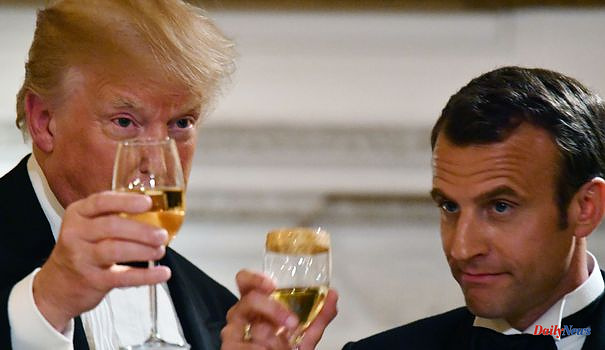Embarrassing and potentially explosive, the affair is already making Paris cringe. As part of an investigation into a possible concealment of state secrets by Donald Trump, the FBI is currently conducting an investigation which led it to carry out a search, Monday, August 8, at Mar-a-Lago, the secondary residence of the former US president in Palm Beach (Florida), which is described by the federal police as "a seaside club and a residence, corresponding to a mansion of 57 rooms and 33 bathrooms on a 7-hectare land."
The case is already causing a stir across the Atlantic. And for good reason. Instead of transferring all the archives of his presidency to the National Archives of the Library of Congress, as required by law, the 45th President of the United States, on the contrary, kept with him a large number of classified documents. according to three levels of ultra-confidentiality: "confidential", "secret", "top-secret". Monday morning, investigators from the "Bureau" (nickname of the FBI) opened Donald Trump's safe - he was in New York - and seized fifteen boxes of documents.
In front of Mar-a-Lago, Donald Trump's residence in Palm Beach (Florida), during the FBI search Monday August 8, 2022
Giorgio Viera / AFP)
Some contain photos while others relate to the amnesty granted at the end of the mandate to Roger Stone, a friend and political adviser of the president. More serious: boxes would contain information related to American nuclear secrets. But a file from Trump's safe holds particular attention since its title, which is in two words, indicates: "President of France". This suggests that the ex-tenant of the White House kept sensitive personal information about his former French counterpart at home.
“The services of each country have files on each of the foreign heads of state, explains an American analyst linked to the world of intelligence. It is a usual practice. Having elements of personal information on such or such counterpart can be be useful in order, for example, to exert pressure in the context of negotiations. But the surprising thing here is that Trump has embarked on a file concerning Emmanuel Macron. He is also the only one in this case: Trump apparently has no other file concerning a foreign leader. On the surface, the relationship between the two men did not seem bad. But Trump was never, deep down, a big fan of Macron. Their friendship was only a facade.
The private club restaurant at Mar-a-Lago was singled out for thirteen food safety violations during a recent inspection.
AFP/JIM WATSON
Between them, things had started well. For one, by a visit to the Champs-Elysées on the occasion of the parade on July 14, 2017, followed by a dinner at the Eiffel Tower with "Melania" and "Brigitte". For the other, by a state visit to Washington considered successful by everyone. All embellished with virile handshakes but also with differences, starting with that on the American withdrawal from the Iranian nuclear agreement, to which were added other differences of opinion - for example on the transatlantic relationship between the Europe and the United States within the framework of NATO.
There remain, at this stage, unanswered questions. Is Emmanuel Macron really the only contemporary head of state of Trump on whom the latter had files? Does the billionaire have other hidden files elsewhere? And, concerning Macron, did he have elements likely to put pressure on him? A certainty: Donald Trump had something in mind concerning the tenant of the Elysée.
The FBI search raises other questions. Apart from the "President of France" file, according to the nomenclature of the FBI, the investigators seized two boxes of photos. What kind of photos are these? Compromising images for his political adversaries? Finally: what does the ex-head of state risk? If he was hiding nuclear secrets, Trump is playing big, because such secrets are protected by special law and cannot be "declassified" at the whim of a president. But this is the line of defense of Trump's lawyers: the latter has the ability to "declassify" documents at his pleasure; having taken them to his home would therefore not amount to any concealment of state secrets. Except that, concerning nuclear secrets, this reasoning does not hold.
Coming back to France, a remark is in order. As true as Paris is Washington's oldest historic ally (Republicans and Democrats repeat it over and over again to please the French), these two capitals are also rivals on the market for arms contracts and the export of their nuclear know-how - the Australian submarine affair amply demonstrated this less than a year ago. Could this rivalry be linked to the existence of a "President of France" file in Donald Trump's office in Florida? It is possible that we will never know.












